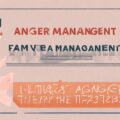Anger is a natural emotion that everyone experiences from time to time. However, when anger becomes overwhelming or uncontrollable, it can lead to problems in various aspects of life. This comprehensive guide will provide you with an understanding of anger management tests and how they can help you assess and manage your anger effectively.
What is an Anger Management Test?
An anger management test is a tool designed to measure the severity of an individual’s anger and identify the underlying causes. It typically includes a series of questions that assess emotional responses, triggers, and coping mechanisms. The results of the test can help individuals recognize patterns in their anger and develop strategies to manage it more effectively.
Why Take an Anger Management Test?
Taking an anger management test can be beneficial for several reasons:
- Self-awareness: Understanding your anger triggers and responses can help you become more self-aware.
- Improved relationships: Managing anger effectively can lead to better relationships with family, friends, and colleagues.
- Better health: Chronic anger can have negative effects on physical and mental health. Managing anger can improve overall well-being.
- Stress reduction: Learning to control anger can help reduce stress and improve your quality of life.
Types of Anger Management Tests
There are various types of anger management tests available, including:
Self-Assessment Questionnaires
These are the most common type of anger management tests. They involve answering a series of questions about your feelings, behaviors, and reactions to different situations. Examples include the State-Trait Anger Expression Inventory (STAXI) and the Anger Disorders Scale (ADS).
Clinical Evaluations
These tests are conducted by mental health professionals and may include interviews, observations, and standardized assessment tools. They provide a more comprehensive evaluation of an individual’s anger issues.
How to Prepare for an Anger Management Test
Preparing for an anger management test can help you get the most accurate results. Here are some tips:
- Be honest: Answer the questions as truthfully as possible to get an accurate assessment.
- Reflect on your experiences: Think about recent situations where you felt angry and how you responded.
- Stay calm: Try to remain calm and focused while taking the test.
- Seek support: If you’re unsure about your responses, consider discussing them with a trusted friend or therapist.
Interpreting the Results
Once you’ve completed an anger management test, it’s important to understand what the results mean. Most tests will provide a score or rating that indicates the severity of your anger. Here’s how to interpret these results:
- Mild Anger: Indicates that your anger is generally under control and doesn’t significantly impact your life.
- Moderate Anger: Suggests that you may experience occasional difficulties with anger and could benefit from strategies to manage it more effectively.
- Severe Anger: Indicates that anger is a significant issue in your life and may require professional intervention to address.
Strategies for Managing Anger
If your anger management test indicates that you need to work on controlling your anger, here are some effective strategies:
- Practice relaxation techniques: Deep breathing, meditation, and yoga can help calm your mind and reduce anger.
- Exercise regularly: Physical activity can help release built-up tension and improve your mood.
- Develop healthy communication skills: Learn to express your feelings calmly and assertively without resorting to aggression.
- Seek professional help: A therapist or counselor can provide guidance and support in managing anger.
FAQ
What is the purpose of an anger management test?
An anger management test helps individuals assess the severity of their anger, identify triggers, and develop strategies to manage their anger more effectively.
How accurate are anger management tests?
While self-assessment questionnaires can provide valuable insights, clinical evaluations conducted by mental health professionals are generally more accurate and comprehensive.
Can children take anger management tests?
Yes, there are specific anger management tests designed for children and adolescents to help them understand and manage their anger.
How often should I take an anger management test?
It depends on your individual needs. Some people may benefit from taking the test periodically to monitor their progress, while others may only need to take it once.
What should I do if my test results indicate severe anger?
If your test results indicate severe anger, it’s important to seek professional help from a therapist or counselor who can provide personalized strategies and support.









